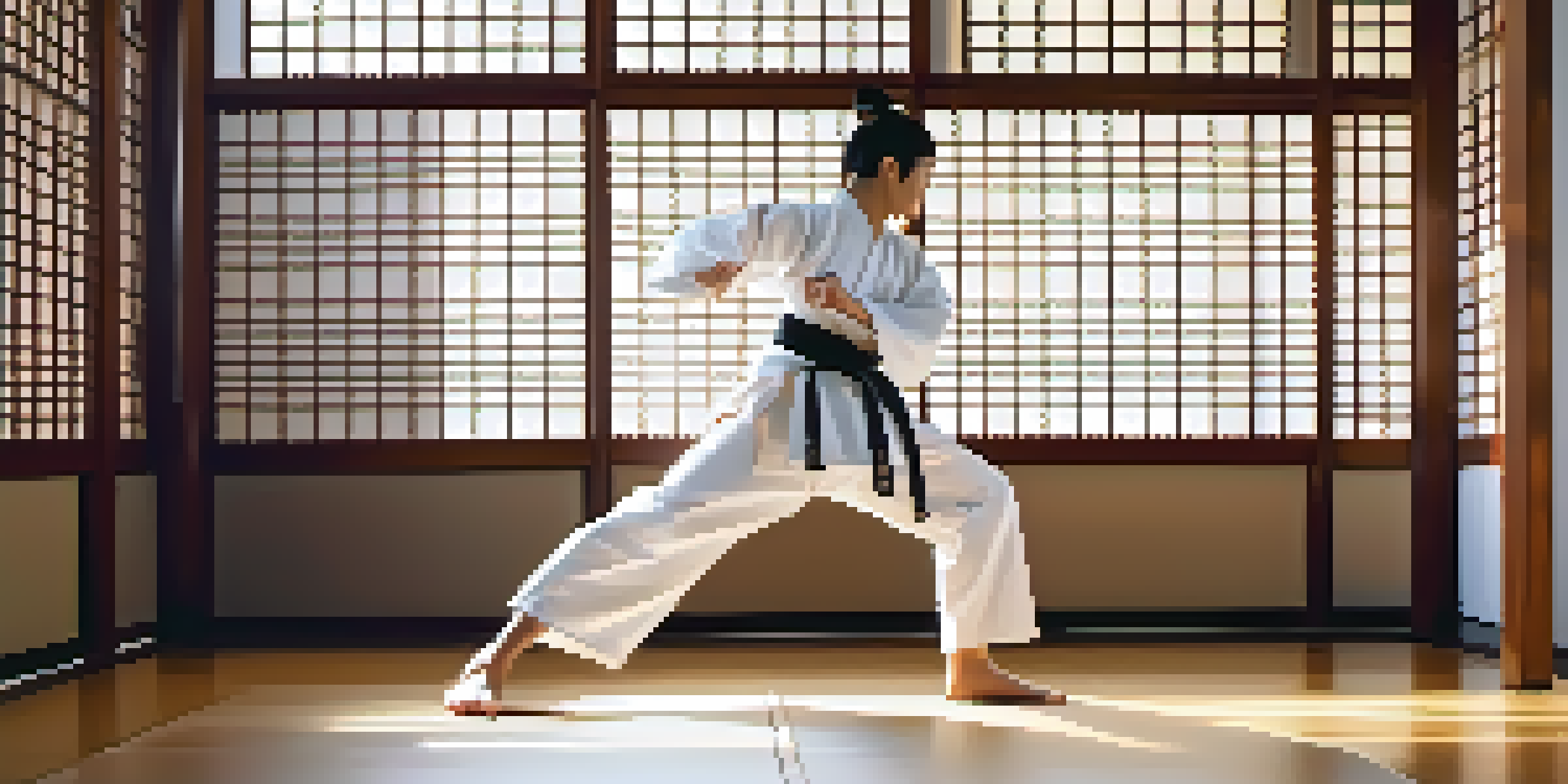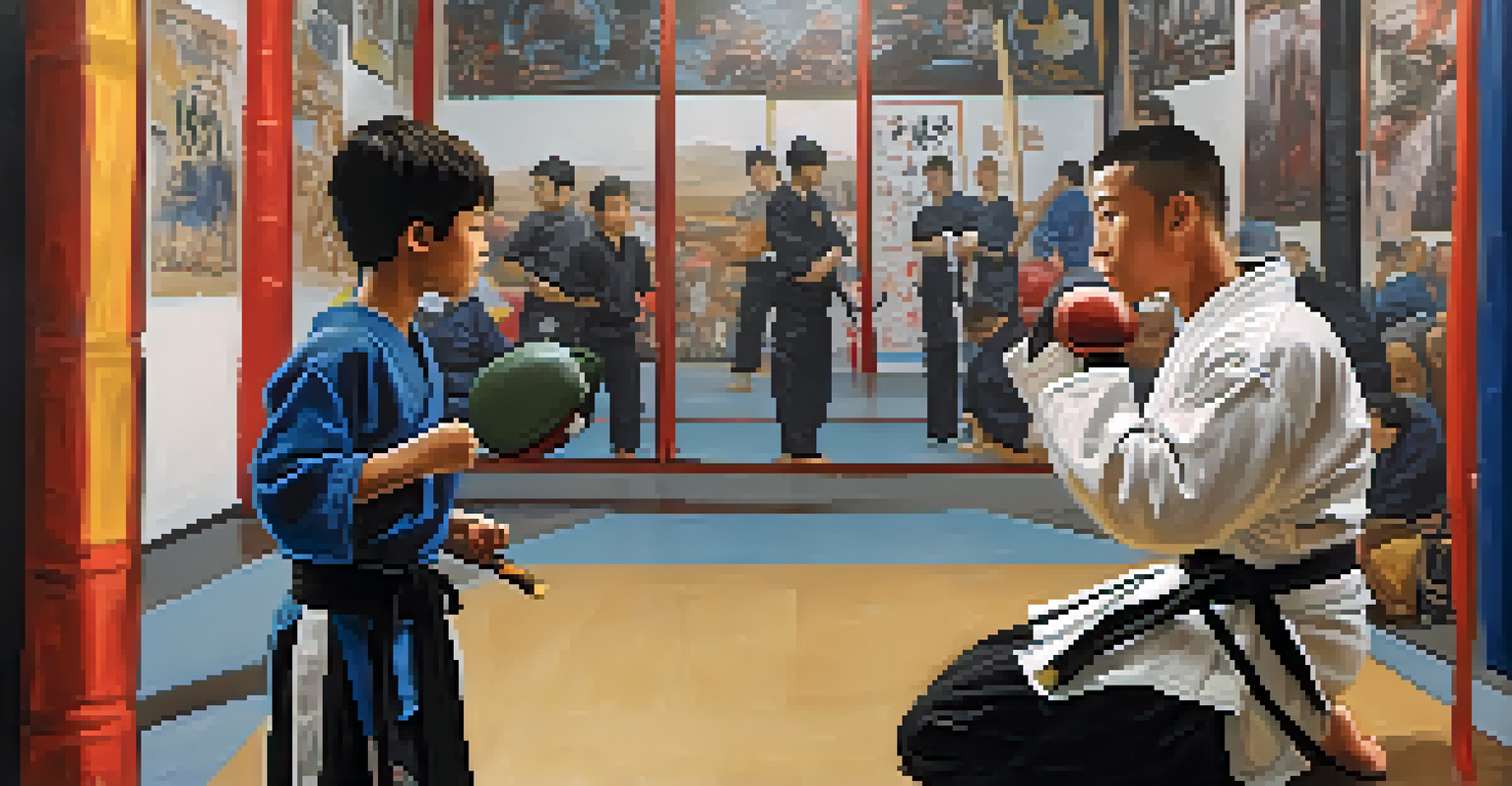The Role of Discipline in Martial Arts and Leadership

Understanding Discipline in Martial Arts
Discipline in martial arts goes beyond just physical training; it embodies a mindset. Practitioners learn to control their bodies and emotions, cultivating a strong sense of self. This discipline is not merely about following rules but developing the mental fortitude to overcome challenges.
Discipline is the bridge between goals and accomplishment.
For instance, consider a martial artist who practices daily, honing their skills and techniques. This regular commitment to training reflects a dedication to personal growth and mastery. Over time, these small, disciplined habits lead to significant improvements and accomplishments.
Ultimately, discipline in martial arts lays a foundation for success, teaching practitioners the value of perseverance and focus. This mindset is crucial not only in martial arts but also in various aspects of life, including leadership.
The Connection Between Discipline and Leadership
Leadership and discipline are intertwined; effective leaders often exhibit strong self-discipline. Just like martial artists, leaders must make tough decisions and remain composed under pressure. This ability to maintain focus and clarity is vital when navigating challenges.

For example, think of a leader in a corporate setting who faces a crisis. Their disciplined approach allows them to analyze the situation calmly, strategize effectively, and guide their team through uncertainty. In this way, discipline becomes a crucial tool for effective leadership.
Discipline Fuels Personal Growth
Martial arts training cultivates self-discipline, resilience, and emotional intelligence, which are essential for personal development.
Furthermore, leaders who embody discipline inspire their teams to adopt similar values. This creates a culture of accountability and commitment, essential for fostering a productive and motivated work environment.
Discipline as a Tool for Personal Development
Martial arts training is a powerful vehicle for personal development through discipline. It encourages individuals to set goals, whether mastering a specific technique or achieving a higher belt rank. This goal-setting process requires consistent effort and self-discipline.
Success is no accident. It is hard work, perseverance, learning, studying, sacrifice, and most of all, love of what you are doing or learning to do.
As practitioners push through challenges and setbacks, they build resilience. This resilience translates into various aspects of life, helping individuals face personal and professional obstacles with confidence. The discipline learned in martial arts can lead to greater self-awareness and emotional intelligence.
Ultimately, this personal growth fosters a well-rounded leader. A disciplined individual is more likely to empathize with their team and understand the importance of supporting others in their journeys.
Learning from Failure: A Discipline Perspective
Failure is an inevitable part of both martial arts and leadership. However, a disciplined mindset helps individuals view failure as an opportunity for growth rather than a setback. In martial arts, every fall or missed technique serves as a lesson to improve.
For instance, a martial artist who loses a match analyzes their performance to identify weaknesses. This self-reflection fosters a growth mindset, encouraging continuous improvement. Similarly, leaders who face failures can learn valuable lessons that contribute to their development.
Leadership Requires Strong Discipline
Effective leaders display self-discipline, enabling them to make sound decisions and inspire their teams during challenging times.
By embracing failure and applying discipline to learn from it, both martial artists and leaders can cultivate resilience. This process ultimately strengthens their character and enhances their ability to lead effectively.
Setting Goals: A Discipline-Driven Approach
Goal setting is a fundamental aspect of martial arts and leadership, and discipline plays a crucial role in this process. In martial arts, practitioners often set specific, measurable goals, such as achieving a new belt rank or mastering a technique. This structured approach to goal setting fosters a sense of accountability.
Leaders can adopt a similar strategy by establishing clear objectives for their teams. By setting realistic and achievable goals, leaders create a roadmap for success, encouraging collaboration and motivation. Discipline ensures that everyone remains focused on these goals, even amidst challenges.
Moreover, the discipline learned in martial arts helps individuals stay committed to their goals. This commitment not only boosts personal achievement but also inspires teams to strive for excellence together.
The Role of Mentorship in Martial Arts and Leadership
Mentorship is a vital component of both martial arts training and effective leadership. In martial arts, experienced practitioners often guide novices, sharing their knowledge and expertise. This mentorship fosters a sense of community and encourages discipline among students.
Similarly, leaders who mentor their team members provide valuable guidance and support. This relationship cultivates trust and respect, essential for a productive work environment. By demonstrating discipline, mentors inspire their mentees to adopt similar values in their professional journeys.
Mentorship Enhances Discipline
In both martial arts and leadership, mentorship fosters discipline and accountability, shaping the next generation of leaders.
Ultimately, mentorship bridges the gap between experience and learning. Through discipline, mentors can instill the importance of hard work and perseverance, shaping the next generation of leaders.
Applying Martial Arts Discipline to Everyday Leadership
The principles of discipline learned in martial arts can seamlessly translate to everyday leadership scenarios. Practicing mindfulness, for instance, is a key aspect of martial arts that helps individuals remain present and focused. Leaders who apply this principle can enhance their decision-making processes.
Imagine a team meeting where a leader practices active listening, reflecting the mindfulness cultivated in martial arts. This approach fosters open communication and collaboration, essential for team success. By embodying discipline, leaders can create a positive and productive environment.

Moreover, leaders who adopt a disciplined approach to time management can prioritize tasks more effectively. This skill not only boosts productivity but also sets a strong example for team members, encouraging them to develop their own discipline.